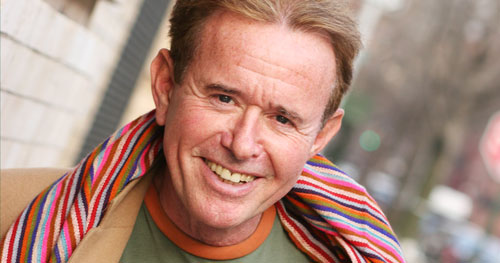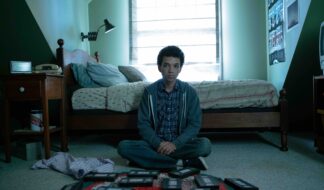By Christopher Treacy

Photo: Paula Court
When I spoke with Jefferson Airplane's Grace Slick years ago, she'd retired from rock 'n' roll in favor of painting. But the trippy subject matter remained - Slick had busied herself painting variations on scenes from "Alice in Wonderland," also the jumping off point for what's likely her most remembered song, "White Rabbit." She defended her enduring enthusiasm for Lewis Carroll's surreal tale by noting its undertones of feminism and independence - girl seeks adventure, follows muse, forges her own path. Fair enough.
But there are always multiple ways to interpret a good story, especially one with as many fantastical happenings as "Alice in Wonderland." For nearly 40 of his 70-something years, New York-based composer David Del Tredici has returned to "Alice" again and again, creating musical works that have broken barriers, blazed new trails and - inevitably - pissed off the purists.
This holiday season he brings his final meditation on "Alice," an opera entitled "Dum Dee Tweedle," to the DSO for its world premiere at Orchestra Hall on Nov. 30. The performance features soprano Hila Plitmann, tenor Scott Ramsay, baritone Michael Kelly and the Wayne State University Symphonic Choir. Leonard Slatkin, a longtime supporter and former music director of the National Symphony Orchestra, will conduct the DSO.
"It's total nonsense," Del Tredici says over the phone from New York during our recent chat. "There really is no plot, it's not a normal opera. This is what we might call a 'director's opera' - everything is askew. The actual text is from the story's "Through the Looking Glass" chapter, but each chapter is a short story unto itself. There's a ballet of hopping oysters, a snoring machine, a conversation with a Walrus and a Carpenter - the story revolves around the oysters being coerced out of the water."
To further spice up the already surreal storyline, largely taken from a poem read to "Alice" by Tweedeledum & Tweedledee, Del Tredici has also added in a moral from Martin Gardner's "The Annotated Alice," a sort of companion piece to Carroll's saga that was published in the early 1960s.
Although this is the premiere of "Dum Dee Tweedle," Del Tredici wrote the opera some 20 years ago while his then-partner was dying of AIDS. Though he didn't necessarily make the connection at the time, he now admits that the fast, furious pace of the music was likely a respite from the melancholy conditions of his personal life. It's just one more way that he's used the "Alice" story as a vehicle to deal with personal issues throughout his career. But it turns out that his fascination has more to do with Carroll's dark side than his beloved heroine.
"At some point early on, I developed an intense connection to Lewis Carroll," he recalls. "I was out, but the 'Alice' compositions have allowed me to express my sexuality through my professional work. Lewis Carroll hung out with little girls, and he used his storytelling as a way of holding their attention. He made up the "Alice in Wonderland" story for a little girl he was likely in love with who happened to be named Alice. There's no evidence that he was ever able to act on his impulses, but here's this man with a penchant for little girls spending time with them and telling them stories to keep them entertained - it's a bit like a closeted gay man handing out towels in a bathhouse.
"In that light," he continues, "his perversion actually created the stories. The pain of having to translate your desire into something more socially acceptable and the double-life that creates - that's what fascinated me. It adds a sting to the Victorian wit and whimsy that colors the story as charming, which also appealed to me."
Audiences in the U.K. prefer that Victorian charm and were taken aback by the not-niceness that Del Tredici lets float to the surface in his "Alice"-related work, but here in the states, the 1976 debut of "Final Alice" elevated his status from an already respected avant-garde composer to that of a ballsy rule-breaker, merely by incorporating greater levels of tonality. It doesn't sound that daring now, in our hybrid-heavy world, but in the pinched circles of the mid-70s classical elite, Del Tredici had become a loose cannon. Although it was actually his fifth Lewis Carroll-inspired work, which came after his earlier meditations on James Joyce, "Final Alice" blew open the doors to a period of Neo-Romanticism in the contemporary classical world, allowing young composers to incorporate elements of the old guard into new music. A few years later, "In Memory of a Summer Day" won him the 1980 Pulitzer Prize in music. Both produced bestselling soundtracks.
"Dum Dee Tweedle" is being advertised as the last "Alice" piece Del Tredici will do, and he says this is probably true, but he's not closing the door to possibility. It's his first true opera (although some of his previous work lies on the fringes of the form), not to mention the largest and longest of the individual "Alice" pieces, which creates an air of finality.
Either way, he's certainly found a voice to express his concerns as a gay man outside the scope of Lewis Carroll narratives; "Gay Life," "S/M Ballade," "Queer Hosannas" and "Wondrous the Merge" are a few titles that jump out from his prolific list of accomplishments. And just this past summer he premiered a piece called "Bullycide," for piano sextet, inspired by the well-publicized cluster of gay teen suicides in 2010 (which led to the It Gets Better campaign).
"Whatever touches me, I'll write a piece about it," he says. "I think, as gay people, we know what it is to be lonely, afraid and isolated. Straights are more connected to the world, whereas that lack of connection leaves us with much more energy to develop creativity. The trauma of being gay only adds to that, and certainly as composers go, it gives us more to work with, more to turn into music. It's gratifying to have something to show for yourself."
Wolfgang & Wonderland
'Dum Dee Tweedle' (world premiere)
8 p.m. Nov. 30, 3 p.m. Dec. 1
Orchestra Hall
3711 Woodward Ave., Detroit
http://www.dso.org









